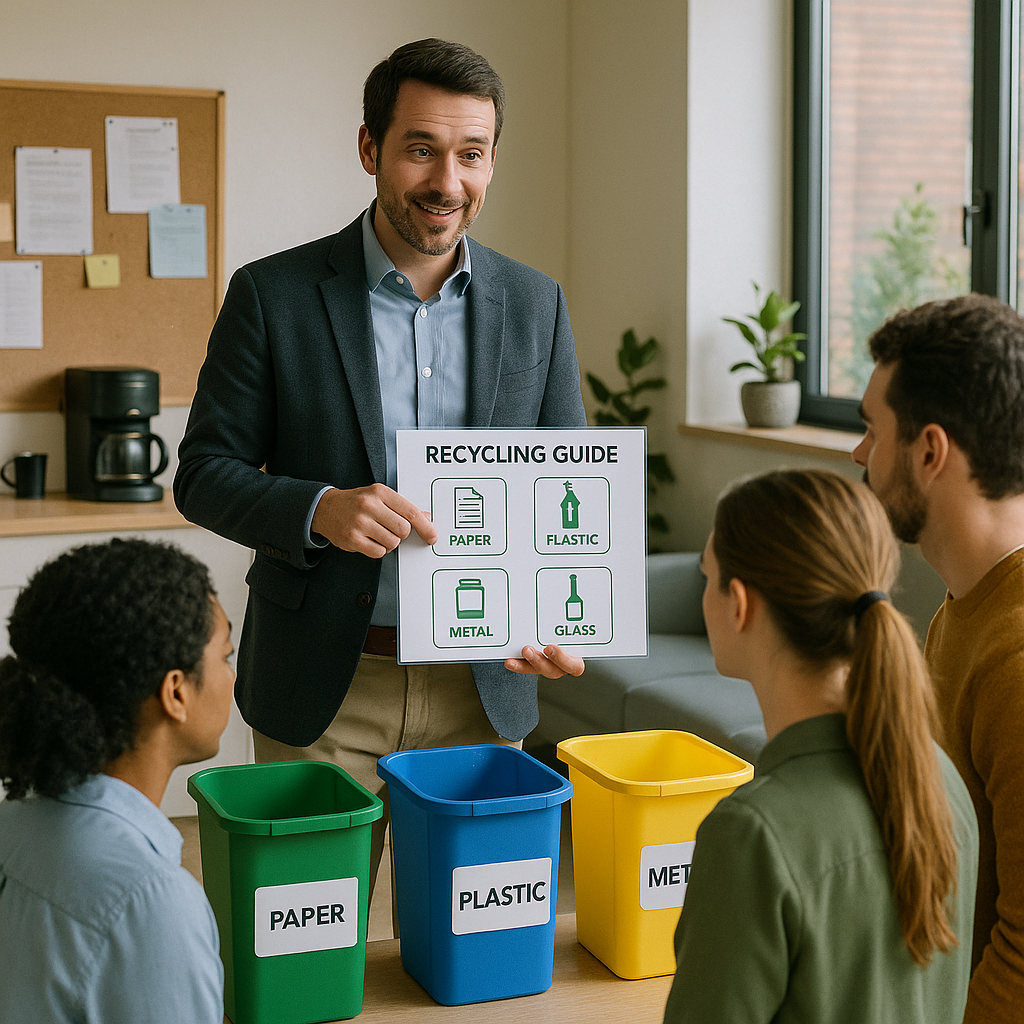5901 Botham Jean Blvd, Dallas, TX 75215
Corporate Recycling Programs: Financial Benefits, Employee Engagement, and Environmental Impact
September 10, 2025Corporate recycling programs are structured initiatives that businesses implement to divert reusable materials from landfills. These strategic systems help companies manage waste more efficiently while supporting broader environmental goals. The programs focus on collecting, sorting, and processing materials like paper, cardboard, plastics, and metals that would otherwise end up as waste.
Every year, businesses generate millions of tons of waste. Forward-thinking companies now recognize that recycling programs offer both environmental and economic advantages. The increasing costs of raw materials and waste disposal have made recycling not just an ethical choice but a smart business decision.
As environmental regulations tighten across industries, more businesses are adopting formal recycling processes. Companies ranging from small offices to large manufacturing facilities find that these programs help them comply with local ordinances while enhancing their sustainability credentials. The most successful initiatives integrate recycling into everyday operations, making environmental responsibility a part of the company culture.
What Are the Financial Benefits of Corporate Recycling?

Corporate recycling programs offer significant financial benefits beyond their environmental impact. Companies implementing comprehensive recycling initiatives can turn what was once an expense into a strategic financial asset.
Reduced Waste Disposal Costs
The most immediate financial benefit comes from reduced waste disposal expenses. As landfill costs rise, businesses diverting recyclable materials from general waste streams see significant savings. Companies with robust recycling programs can cut their waste disposal costs by up to 30%.
These savings accumulate quickly when businesses reduce the frequency and size of waste pickups. For many organizations, waste hauling and disposal fees are a substantial operational expense that can be significantly reduced through effective recycling.
The calculations are simple. Sending less waste to landfills results in lower hauling and disposal fees. Businesses with comprehensive recycling programs often experience up to a 50% reduction in their waste disposal costs.
Revenue Generation Through Recyclables
Many businesses overlook potential revenue streams available through recycling. Materials like cardboard, metals, plastics, and paper have real market value and can be sold to recyclers who process these into new products.
Consider Anheuser-Busch’s Newark Brewery, which generated nearly $1.25 million from selling recyclable byproducts. Even smaller operations can see impressive returns; New Jersey Resources brought in over $96,000 just from recycling metals.
Scrap metal represents a particularly valuable opportunity. Approximately 2-3% of all post-recycled waste is metal, which can be sold to generate consistent revenue. Other materials like plastics and even organic waste can be reused in operations or sold to appropriate buyers.
Tax Incentives and Financial Support
Many jurisdictions offer significant tax benefits to encourage corporate recycling. Businesses can receive income tax credits ranging from $500 to $750 for every $100,000 invested in recycling technology and infrastructure.
Beyond tax credits, companies committed to recycling may qualify for state or federal grants to help fund their sustainability efforts. These financial incentives can substantially offset the initial costs of implementing a recycling program.
Local governments increasingly provide rebates and incentives for businesses that demonstrate commitment to waste reduction goals. These programs can provide immediate financial returns while supporting longer-term sustainability objectives.
Operational Cost Savings
Recycling initiatives often lead to greater operational efficiency across the organization. By evaluating waste management processes, businesses frequently identify wasteful practices and opportunities to streamline operations.
The impact can be substantial, with some companies saving up to $100 per employee annually on waste management costs. These savings extend beyond waste disposal to include reduced procurement costs for raw materials when recycled materials are incorporated into production processes.
Take Lockheed Martin’s facility in Moorestown, New Jersey, which reported $145,562 in avoided disposal costs through their recycling program. Similarly, WithumSmith+Brown, an accounting firm, saved over $22,000 in storage costs and $45,000 in printing expenses by adopting a ‘paperless’ office initiative.
Enhanced Brand Value and Customer Loyalty
Financial benefits extend beyond direct cost savings. Companies with robust recycling programs often find themselves with a competitive edge in today’s environmentally conscious market.
Studies show that nearly 70% of consumers are willing to pay more for products and services from businesses that demonstrate environmental responsibility. This increased customer loyalty translates to higher revenues and a stronger market position.
By promoting recycling efforts, businesses can strengthen relationships with eco-conscious customers and improve their corporate social responsibility profile. This market advantage becomes increasingly valuable as consumer preferences continue to shift toward sustainable brands.
How Do Recycling Programs Impact Employee Satisfaction and Recruitment?

Corporate recycling initiatives have evolved into powerful tools for attracting and retaining top talent, beyond just being about environmental responsibility. Today’s workforce, especially millennials, increasingly seeks employers that demonstrate a true commitment to sustainability and environmental stewardship.
Studies reveal that employees are more motivated to work for environmentally conscious organizations. This connection is particularly strong among younger workers, with nearly one in ten millennials considering leaving their job if their employer lacks sustainable practices. This highlights how environmental values are increasingly influencing career decisions for many professionals.
Building Community Through Shared Environmental Values
When companies implement recycling programs, they create more than just waste diversion systems; they foster a sense of shared purpose among team members. Employees working together toward sustainability goals develop stronger connections beyond their day-to-day responsibilities.
This community aspect transforms recycling from a simple operational procedure into a culture-building activity. Staff members take pride in contributing to collective environmental efforts, with shared commitments to proper waste sorting and resource conservation fostering connections between departments and individuals who might otherwise have limited interaction.
Companies that recognize and celebrate recycling achievements enhance this community feeling. Friendly department competitions or public recognition of sustainability champions reinforce the value placed on environmental stewardship within the organization.
Increased Job Satisfaction and Retention
Workplace recycling programs contribute directly to higher job satisfaction levels. Seeing their company take concrete steps toward sustainability reinforces employees’ sense of working for an organization with values that align with their own, fostering stronger employee engagement.
The impact extends beyond satisfaction metrics. Organizations with robust environmental initiatives often experience improved retention rates. Employees feel greater loyalty to companies demonstrating responsibility beyond profit margins, leading to significant cost savings in recruiting and training replacements.
Environmental initiatives also provide opportunities for employees to contribute beyond their job descriptions. Serving as green team members or sustainability ambassadors provides staff additional avenues for professional growth and workplace contribution, leading to increased job satisfaction and stronger organizational commitment.
Attracting Top Talent in Competitive Markets
In today’s competitive labor markets, recycling and sustainability programs give companies a distinct advantage in recruitment. Job seekers increasingly investigate potential employers’ environmental policies before applying or accepting positions. A visible commitment to recycling signals broader corporate responsibility that attracts sustainability-minded candidates.
Corporate environmental credentials particularly resonate with younger generations entering the workforce. For these workers, company values often hold equal or greater importance than traditional factors like compensation. Organizations prominently showcasing their recycling successes in recruitment materials connect with these candidates on a values level before the interview process begins.
Many companies report that highlighting their sustainability initiatives during interviews helps secure top candidates considering multiple offers. When qualifications and compensation packages are similar, environmental commitment often becomes the deciding factor for environmentally conscious applicants.
Even for candidates not specifically seeking green employers, recycling programs suggest a forward-thinking, responsible organization. This perception suggests the company likely takes progressive approaches in other operational areas as well.
Practical Implementation for Maximum Impact
For recycling programs to positively impact employee satisfaction and recruitment, they must offer more than superficial gestures. Workers quickly recognize the difference between genuine environmental commitment and “greenwashing” attempts. Programs involving employees in planning and implementation generate the strongest positive responses.
Successful companies make sustainability initiatives visible throughout the workplace with clear signage, regular communications about environmental impact, and opportunities for direct participation. This visibility keeps environmental commitments top-of-mind for current employees while demonstrating values to potential recruits touring facilities.
Organizations seeing the greatest recruitment and retention benefits from recycling programs typically go beyond basic compliance, creating comprehensive sustainability approaches that incorporate employee suggestions and celebrate progress toward environmental goals. This collaborative approach generates stronger workforce engagement than top-down mandates.
By integrating recycling into the broader corporate culture instead of treating it as a separate initiative, companies maximize its positive impact on employee satisfaction. When environmental responsibility becomes part of the organizational identity, it creates a stronger sense of purpose that resonates with both current and prospective team members.
What Are the Environmental Impacts of Corporate Recycling?

Corporate recycling programs deliver substantial environmental benefits that extend beyond simple waste reduction. When businesses implement effective recycling initiatives, they create positive ripple effects throughout ecosystems worldwide. The most immediate impact is the diversion of materials from landfills, where decomposing waste produces methane and leaches harmful chemicals into surrounding soil and groundwater.
Resource conservation is a primary environmental benefit of corporate recycling. Every ton of recycled paper saves approximately 17 trees, directly aiding forest preservation and biodiversity protection. This conservation extends to other resources as well. Recycling one ton of steel conserves 2,500 pounds of iron ore, 1,400 pounds of coal, and 120 pounds of limestone—resources that would otherwise require energy-intensive extraction.
Energy savings from corporate recycling are substantial. Manufacturing with recycled materials requires significantly less energy than using virgin resources. For example, recycling paper uses 65% less energy than producing new paper products from raw materials. The energy savings extend to other materials as well—recycling aluminum saves up to 95% of the energy required to produce it from bauxite ore.
Climate Change Mitigation Through Waste Reduction
Corporate recycling plays a crucial role in battling climate change by reducing greenhouse gas emissions. Current data shows recycling saves over 700 million tonnes of CO2 emissions annually, with projections reaching 1 billion tonnes. This reduction stems from lower energy requirements for processing recycled materials compared to manufacturing from raw resources.
When businesses divert organic materials like paper and food waste from landfills, they prevent the generation of methane—a greenhouse gas 25 times more potent than carbon dioxide. This aspect of corporate recycling contributes directly to climate stabilization efforts, helping businesses reduce their carbon footprint.
Glass recycling clearly illustrates these climate benefits. Manufacturing glass from recycled materials saves up to 30% of the energy compared to producing new glass from raw materials. These energy savings translate directly to reduced carbon emissions throughout the production chain.
Protecting Ecosystems and Biodiversity
Corporate recycling initiatives help safeguard natural habitats in several ways. By reducing the demand for virgin materials, recycling minimizes habitat destruction associated with mining, logging, and other resource extraction activities. These processes often lead to deforestation, soil erosion, and water contamination that threaten plant and animal species.
Protecting waterways is another significant environmental benefit. Manufacturing paper from virgin pulp requires substantial water resources and produces wastewater containing chemicals used in processing. When companies opt for recycled paper products, they help conserve water and reduce pollution in rivers, lakes, and streams.
Effective corporate recycling can divert up to 63% of waste materials like food waste, paper, cardboard, and plastics from landfills. This waste diversion translates to less land needed for disposal sites, preserving natural spaces and reducing the negative impacts of landfills on surrounding communities and ecosystems.
Building Toward a Circular Economy
One of the greatest environmental benefits of corporate recycling is its contribution to a circular economy model. This approach transforms our relationship with resources, moving from an extract-use-dispose system to one that works in harmony with natural cycles.
In a circular economy, materials maintain their value through continuous reuse, reducing the need for constant resource extraction and minimizing waste generation. Companies implementing effective recycling programs take a crucial step toward this sustainable economic model.
Businesses transitioning to circular systems often redesign their products and processes for greater resource efficiency. This leads to less waste, reduced material inputs, and optimized resource usage throughout the production cycle. The environmental benefits compound as more companies adopt this approach.
Corporate recycling initiatives deliver multiple environmental benefits that extend beyond waste reduction. Through resource conservation, energy savings, pollution prevention, and climate impact reduction, business recycling programs contribute significantly to environmental protection and sustainability. The collective impact of these efforts helps create a healthier planet while providing economic advantages for participating companies.
How Can Businesses Implement Effective Recycling Programs?

Implementing an effective recycling program is crucial for businesses aiming to reduce their environmental impact and potentially lower waste management costs. A structured approach can ensure these programs produce measurable results and maintain long-term success. Here’s how your business can implement a successful recycling initiative.
Conduct a Comprehensive Waste Audit
Before starting any recycling program, conduct a thorough waste audit to understand the materials your business generates. This step provides valuable insights into your waste composition and identifies recycling opportunities.
During your waste audit, document the types and quantities of materials discarded, current disposal methods, and associated costs. Pay special attention to high-value recyclables like corrugated cardboard, aluminum, and plastic bottles, which can often generate revenue when properly recycled.
The data gathered during this assessment serves as your baseline, helping you set realistic goals and measure future progress. Many businesses find significant portions of their waste stream are recyclable, offering immediate opportunities for improvement.
Define Clear Goals and Infrastructure
Based on your waste audit findings, set specific, measurable, and time-bound recycling goals. These might include reducing landfill waste by a certain percentage, achieving specific diversion rates, or eliminating particular waste streams.
Invest in appropriate recycling infrastructure to support these goals. The right equipment is key to program success. Consider adding:
- Strategically placed collection bins throughout your facility
- Clearly labeled containers for different recyclable materials
- Balers or compactors for high-volume materials like cardboard
- Designated storage areas for collected recyclables
Keep infrastructure simple and accessible. The easier recycling is for employees, the higher participation rates you’ll achieve. Position recycling stations in convenient locations where waste is typically generated.
Engage and Educate Your Employees
Employee education is the foundation of successful recycling programs. Develop comprehensive training that covers the nuts and bolts of your recycling initiatives. Schedule regular sessions to ensure everyone understands proper sorting procedures.
Use clear signage with visual guides showing which materials belong in each container. Address common recycling misconceptions and explain how contamination can hinder recycling efforts. Often, recycling failures stem from confusion rather than lack of interest.
Appoint recycling champions in different departments to help monitor program compliance and answer questions. This peer-to-peer guidance can keep sustainability efforts visible throughout the organization.
Collaborate With Specialized Service Providers
Partner with reputable recycling service providers who understand your industry’s specific challenges. A reliable partner can offer valuable expertise on program design, processing capabilities, and market conditions for recyclable materials.
Research service providers thoroughly, asking about their sorting processes, contamination policies, and what happens to materials post-collection. Request references from similar businesses and inquire about their track record of regulatory compliance.
Consider specialized recyclers for unique waste streams like electronic waste, hazardous materials, or industry-specific byproducts. These providers often offer customized solutions that standard waste management services may not.
Monitor, Report, and Improve
Set up systems to track key performance indicators like diversion rates, contamination levels, and cost savings. Regular data collection helps identify successes and areas that need improvement, with many service providers offering reporting tools to simplify this process.
Share program results with stakeholders regularly. Transparent reporting builds credibility and sustains momentum for sustainability initiatives. Highlight both environmental benefits and financial impacts to emphasize the program’s full value.
Review program performance quarterly and be prepared to make adjustments. Recycling markets and technologies evolve constantly, so programs must adapt accordingly. Stay informed about local recycling regulations and industry best practices to ensure ongoing compliance and effectiveness.
Introduce Incentives and Recognition Programs
Recognize departments or individuals who make significant contributions to recycling efforts. Public acknowledgment underscores the importance of the program and encourages continued participation. Consider friendly competitions between departments to boost engagement.
When possible, link recycling performance to business objectives or employee evaluations. This integration signals that sustainability is a core business value, not a side activity. Some businesses also offer tangible incentives for meeting or exceeding recycling targets.
Communicate the financial benefits of successful recycling. Many businesses discover that effective programs generate savings through reduced disposal costs, potential rebates for certain materials, and lower procurement costs when using recycled content.
Conclusion: The Future of Corporate Recycling

Corporate recycling programs have evolved from optional initiatives to essential business strategies. They offer a unique triple benefit: financial advantages through reduced disposal costs, improved employee satisfaction and retention, and significant positive environmental impact. The business case for recycling has never been stronger, with tangible results affecting both operational efficiency and brand reputation.
As environmental regulations tighten and consumer awareness grows, companies with robust recycling initiatives gain a competitive edge. These organizations are better positioned for long-term success through cost reduction, enhanced reputation, and talent attraction, while contributing meaningfully to global sustainability. The future of corporate responsibility is fundamentally built on effective waste management practices that drive the circular economy forward. Businesses looking to improve their recycling infrastructure or start new programs can contact Okon Recycling at 214-717-4083.
